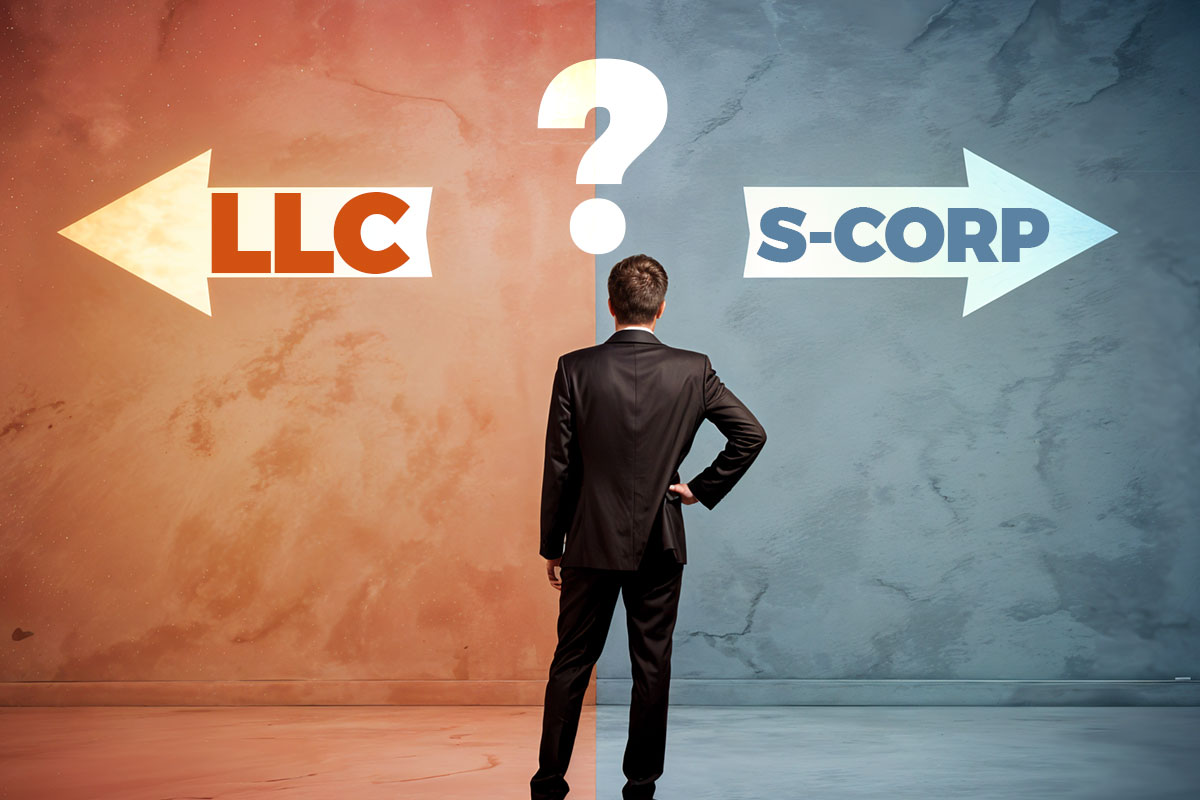Did you know an S corporation can create considerable savings compared to a limited liability company?
An S corporation (S corp) and a limited liability company (LLC) are both excellent choices for business structures. However, once you hit $100K in net income, an S corp might reduce your tax load.
We’re here to help you choose between an S corp vs an LLC. We’ll explain what to consider when choosing one business structure over another, when S corps and LLCs are best, and what they have in common.
We’ll also explore frequently asked questions about choosing between an S corp and an LLC. You can either keep reading or click on any of the links below to jump to the section that interests you:
- What’s better, an LLC or S Corp?
- S Corp and LLC Similarities
- What are the differences between an LLC and S corp?
- LLC vs S Corp: Entity Status
- LLC and S Corp: Business Formation
- LLC or S Corp: Treatment of Business Income
- S corp vs LLC: What are the tax benefits?
- LLCs and S Corporations: Compliance
- How to Form an LLC
- How to Form an S Corporation
- Frequently Asked Questions About LLCs and S Corps
- S corporation vs LLC: Which should you choose?
What’s better, an LLC or S corp?

An LLC is simpler and more cost effective when starting a business because it provides limited liability protection. Meanwhile, an S corp protects your personal assets more effectively and allows you to take on up to 100 outside investors.
When you opt for an S corporation designation, you still need to create an LLC or corporation. The S corp is just a tax code under Subchapter S of Chapter 1 of the Internal Revenue Code.
The tax treatment of a small business changes as they grow in revenue, profit, number of employees, and ownership structure. Complex business structures offer tax benefits, but the savings are offset by the costs of hiring accountants and lawyers to comply with regulations.
You can change your business structure later, but it may come with a tax penalty. When deciding which to choose, consider your revenue and profit goals. Then run a simulation to compare which will have the most financial benefit.
Compare the table below to get a brief understanding of the similarities and differences:
| Business structure | What ownership limitations apply? | Does the structure have limited liability status? | How are taxes treated? |
| Limited liability company | May have one or more owners
Can’t sell stock |
Yes | May file as self-employment, personal, or corporate tax |
| S corporation | Less than 100 people
Some estates and trusts No corporations, partnerships, or nonresident aliens |
Yes | Personal tax |
What is an S corp?
According to the National Small Business Association’s (NSBA) 2023 year-end report, an S corp is the most common type of business entity amongst survey participants.
An S corp files taxes using Subchapter S of the Internal Revenue Code. You must meet the following requirements to form an S corp:
- Have less than 100 stockholders
- Run an LLC or C corp
- Be a U.S. resident
- Maintain one class of stock
- Pay the business owner a reasonable salary
- Pay half of the 15.3% payroll taxes
S corporations are predecessors to LLCs, according to Law Shelf. People also call an S corp by these names:
- Sub S corporation
- Small business corporation
What is a limited liability company?
According to the same NSBA report, an LLC is the second most common business entity. Thirty-two percent of businesses opt for this business structure. The primary reasons people choose an LLC include:
- Separation of business and personal assets
- Ease of forming an LLC
- Separation of personal and business liabilities
- Ability to choose your tax structure
- Paying self-employment tax
S Corp and LLC Similarities

Both an LLC and S corp allow businesses to have more than one owner. They also offer personal liability protection against business debts and lawsuits. In most other ways, they are different.
Keep reading to learn about the differences between an S corp and LLC.
What are the differences between an LLC and S corp?
There are a handful of differences between LLCs and S corporations. Some of the most important differences include the following:
- An LLC is a business entity, while an S corp is a tax filing status.
- An S corp treats business income differently than a default single-member LLC.
- An LLC provides more tax options than an S corp.
- LLCs have fewer compliance requirements.
- LLC owners pay self-employment taxes, but S corps use payroll taxes.
What are the advantages of an S corp over an LLC?

S corps have several advantages over an LLC:
- Pass-through taxation: S corps can pass profits and losses directly to the shareholders’ tax returns and potentially save money on taxes. LLCs can do this too.
- Self-employment taxes: S corp owners can pay themselves a salary and claim half the self-employment taxes as a payroll tax. They can also pay themselves dividends, which don’t incur Social Security and Medicare taxes.
- Shareholder restrictions: S corps restrict the number and type of owners. This may be attractive if you want to avoid having a large number of owners.
What are the advantages of an LLC over an S corp?
One of the reasons many people prefer an LLC over a corporation is that there’s more flexibility in how it’s managed.
- Fewer requirements: An LLC doesn’t have corporate requirements such as hosting an annual shareholder meeting or directors’ meetings. They also have multiple ways they can be treated depending on the number of members and their tax filing status.
- Management: Either LLC members or a manager can run a company.
- Profit distribution: LLCs can assign different profit ratios to each member based on work as opposed to shares owned.
- Pass-through taxation: Single-owner LLCs don’t have to file anything besides a 1040 at the end of the year. Partnerships and other types of LLCs will have other documents to file.
- Tax options: An LLC can file as a sole proprietor, partnership, C corp, S corp, or nonprofit organization by sending a document electing which way they’ll do it the Internal Revenue Service (IRS).
LLC vs S Corp: Entity Status
An S corp is a filing status as opposed to a type of business formation. It’s usually more efficient to start an LLC as a business structure unless you want to take advantage of dividends. You’ll need to create an LLC or a C corporation before you start an S corp.
Before LLCs became a business structure, S corporations were heavily used. Professionals wanted the limited liability protection without the far more significant complication of C corp status. LLCs are becoming far more common, especially because you can turn an LLC into an S corp
LLC and S Corp: Business Formation
The formation of limited liability companies and S corps can be relatively similar. Let’s look at the requirements for each to understand the differences and similarities.
LLC or S Corp: Treatment of Business Income

How LLCs and S corps treat taxable income varies dramatically. Significant differences include:
- Owner employee classification
- Profit treatment
- Treatment of Federal Insurance Contributions Act (FICA) taxes
- Tax code(s) used
We’ll look at each in more detail.
Is the owner of an LLC required to pay self-employment tax?
By default, the government classifies an LLC owner as self-employed, which means the owner:
- Claims the profit or losses as personal income, which is called pass-through income
- Pays the full 15.3% in FICA taxes
- Follows the same tax code as a sole proprietor or partnership
- May choose to file taxes as an S corp or C corp and file based on their tax codes
An S corp owner will handle their income differently. Their income is treated two ways depending on whether they are actively involved in the company.
How is an S corp owner’s income treated when they run the business?

If you actively work in your S corp, there are three major considerations:
- A reasonable salary: You must pay yourself a salary that’s comparable to the U.S. Bureau of Labor Statistics median income (or higher) for your role.
- Losses: Losses are treated as pass-through income, reducing your net income.
- Profits: Profits are treated as dividend income and have three tax brackets: 0%, 15%, and 20%. You don’t pay FICA taxes on dividends.
Your salary will be subject to a 7.65% payroll tax taken out of your paychecks. There’s also a 7.65% tax that comes out of S corp revenue. The latter is considered an expense, which reduces dividends.
S corp owner as a stockholder only
If you’re not actively involved in the management of an S corp, you don’t have to include a reasonable salary. You only have to include losses and profits. This strategy can be beneficial if you pay others to run the company and don’t want to be taxed based on FICA and personal income brackets.
Depending on your role in the business, net income, and other factors, an S corp can have considerable benefits over an LLC. The benefits become tremendous once you’ve reached a net income greater than the median wage for a comparable position. All profit from the S corp will be dividends, which significantly reduces your tax load.
We’ll discuss tax benefits next.
S corp vs LLC: What are the tax benefits?
Both an LLC and S corp have benefits that create tax savings depending on your company’s profits and the number of business owners. The table below shows an S corp’s tax savings over an LLC assuming $500,000 income before taxes.
| Comparison Using Operations Manager Median Pay of $180,000 | |||
| LLC | Working in S Corp | S Corp, Dividends Only | |
| Net Income/Salary | $500,000 | $180,000 | |
| FICA | -$18,228 | -$9,114 | |
| Income Tax | -$148,753 | -$37,831.50 | |
| Dividends | 0 | $320,000 | $500,000 |
| Dividend Taxes | 0 | -$41,749 | -$70,761 |
| After Taxes | $333,019 | $411,306v | $429,239 |
| Effective Tax Rate | 33.40% | 17.74% | 14.15% |
We’ll discuss the benefits of each now.
What are the tax considerations of an LLC?

An LLC owner faces several tax considerations if using the same tax code as a sole proprietorship or partnership:
- The 15.3% self-employment tax is broken into 12.4% for social security and 2.9% for Medicare.
- LLC owners pay personal income tax rates of up to 37%.
- Benefits like health insurance are tax deductible in pass-through taxation.
- Pass-through LLCs can deduct 20% of net income before being taxed.
An LLC can also file as a C corporation or S corporation by filling out the appropriate documentation. Read up on LLCs on the IRS website to learn more about their tax treatment.
From a tax standpoint, the benefit of an LLC is the ability to choose whether filing like a sole proprietor or corporation is best for the business owner. Choose the one with the least tax consequences.
When you own an LLC, pass-through taxation is easier because you only pay personal taxes to the Internal Revenue Service. However, business entities can see even more benefits with an S corp election. Let’s look at that now.
What are some tax considerations when electing S corp status?
S corporations have more tax requirements than an LLC but less than a C corp. S corps don’t pay corporate taxes, but they do have to file a tax return. The requirements for an S corp include:
- Form 1120-S: This form documents income, gains, losses, deductions, and credits.
- Employment taxes: Your company will need to collect and pay payroll taxes, which are the same rate as self-employment taxes. The company and employee split the cost. You’re also responsible for federal unemployment tax.
- Excise taxes: Excise taxes are charged on industries like energy, gambling, and tanning.
Meanwhile, stockholders will have special requirements for their personal tax returns:
- Form 1040: This form is to claim income and losses from S corps, estates, trusts, etc.
- Form 1040-SR: Form 1040-SR is a version of Form 1040 for those over 65 to file their personal tax returns.
- Form 1040-ES: Business owners use Form 1040-ES to pay estimated quarterly taxes for their personal tax returns.
I suggest reviewing Schedule E and other S corp requirements with a licensed tax professional. Information in this blog should not be considered income tax advice.
While there are more requirements for S corp tax status, the S corp tax rate is zero. That means you get most of the benefits of a corporation without the corporate income tax.
If you have to pay taxes, S corp tax treatment definitely beats an LLC once you reach the 25% tax bracket or higher.
LLCs and S Corporations: Compliance

LLCs have a much easier time with compliance than an LLC that elects to be treated as an S corp. Unfortunately, the tax classification is the main reason for selecting S corp status, but it’s also the cause of increased compliance requirements.
If you’re considering having your LLC taxed as an S corp, I recommend getting several estimates from licensed accountants of how much it will increase your costs. If the tax savings are more significant than the additional costs, you can save a lot of money on taxes.
How to Form an LLC
Creating and maintaining an LLC has several main requirements. You’ll need to:
- Pay the filing cost.
- Pay ongoing fees.
- Write an operating agreement.
- Submit the articles of organization.
- Get an employer identification number.
Let’s take a closer look at the filing costs, operating agreement, and the articles of organization. All three are unique to an LLC.
Filing Cost and Ongoing Fees
To form an LLC, you need to register with the secretary of state (SOS) in the state you plan to operate. Filing will require a fee at the state level.
None are over $500, and most are under $300, but you’ll also have to pay ongoing fees that range from $0 to $500 annually. The lowest fees to maintain an LLC are in Pennsylvania, which typically cost $70 every 10 years.
Operating Agreement

An operating agreement states how the business will function. When you file this document with the SOS, it provides the benefits of:
- Personal liability protection
- Making verbal agreements legally enforceable
- Setting rules that are different than your state’s default rules for LLCs
An operating agreement is mandatory in California, New York, Delaware, Missouri, and Maine. Others may give you the option to include one, but the aforementioned states require one. An operating agreement includes:
- The creation date
- Location
- Owners and percentages
- Management and voting interests
- Investment in business
- How profits, losses, and assets, are distributed
- A succession plan
- A dissolution plan
- Anything else required by your state
You’ll need to sign and notarize the operating agreement. If you prefer to work with a company to create your LLC, check out Bizee and Northwest Registered Agent.
Next, we’ll look at the articles of organization.
Articles of Organization
The articles of organization are very similar to the operating agreement, but you must submit the document to the secretary of state’s office. They include:
- Company name
- Description of the company
- Mailing address
- Name and address of the registered (or statutory) agent
- Information about company owners, managers, and officers
The most common reason for rejecting an LLC application is that someone else is using the name.
How to Form an S Corporation

Creating an S corporation requires you to start a business entity with your area’s SOS. You may opt to create an LLC or C corp as your business entity. Then you’ll need to file Form 2553 with the IRS to opt to be treated as an S corp.
Your business must have under 100 stockholders, and they can’t be foreign residents or certain types of legal entities. UpCounsel explains which legal entities can and cannot hold S corp shares, but each one may need to be considered on a case-by-case basis. These restrictions are significant drawbacks of an S corp.
Unless some of the following sections impact your company, I recommend starting with an LLC and opting for an S corp when the benefits outweigh the costs.
Frequently Asked Questions About LLCs and S Corps
The following sections answer some of the most commonly asked questions about S corp and LLC business structures.
Is an LLC a corporation?
An LLC is not a corporation. To review, a corporation can sell stock in the company, while an LLC can’t. An LLC may opt to file taxes as either an S corp or a C corp. Use Form 2553 for an S corp and Form 8832 for a C corp.
Can an LLC be an S corp?

An LLC can become an S corp by filing Form 2253 with the IRS.
Can an S corp own an LLC?
Yes. LLC owners can be any combination of people or legal entities in most states, but some states may have restrictions. You can view the requirements on your local secretary of state’s website.
S Corp vs LLC for real estate
Real estate professionals may want to file as an S corp instead of an LLC because tax benefits can reduce your tax rate. As an employee of an S corp, you have to assign yourself a reasonable salary, but the S corp pays profits as dividends, which have a lower tax rate.
You’ll want to use an S corp vs LLC calculator to establish whether it makes sense to create an S corp.
How does an LLC become an S corp?

An LLC becomes an S corp by filling out Form 2553 and filing taxes using guidance from the IRS.
How to revoke an S corporation election
To revoke S corp status, you’ll need to send a statement of revocation to the IRS. You can find more information about revoking S corp status on the IRS website.
Do S corps pay self-employment taxes?
No. S corps pay owners working in the company a salary, which means they have payroll taxes. Half of the taxes are paid by the company and half by the employee.
If the owner doesn’t work in the company, they will receive dividends. Dividends have their own tax rate and aren’t subject to Social Security and Medicare taxes.
S corporation vs LLC: Which should you choose?
You can’t go wrong forming an LLC or electing S corp tax classification. Both are highly beneficial to small business owners because they each offer liability protection for business owners’ personal assets.
The main difference between the two is income taxes once company profits pass the median income for a comparable position. While I’m not licensed to give legal advice, I would personally start with a single-member LLC, then move to an S corp after reaching a level where the income taxes are reduced.
If you still aren’t sure which structure to use, I suggest reading our other blogs about choosing a formal business structure.
- 11 Types of Business Structures: Which One’s The Best Fit?
- Sole Proprietorship vs LLC – Which Should You Choose?
- S Corp vs C Corp
Which business structure do you have in mind? Let us know in the comments below.




